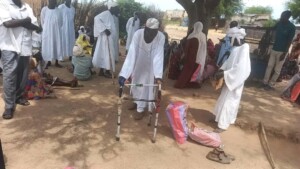Two die of cholera in Sudan’s Kassala
Two women died and two other people were infected with cholera at Aroma locality of Kassala state last week.
Two women died and two other people were infected with cholera at Aroma locality of Kassala state last week.
Ahmed Hasan Dirar told Radio Dabanga that one of the cholera patients was transferred to Kassala Hospital in critical condition, while the other patient is still in a temporary isolation centre.
He said that the deaths occurred on Tuesday.
He pointed out that the health staff in the hospital prevented people from approaching the patients for fear of infection.
He said last Thursday the State Health Ministry sent a committee to Aroma to find out the cases.
He stressed that Aroma Hospital is lacking doctors and is run by medical assistants in a very poor environment.
Sudan’s first cases of cholera were recorded in Blue Nile state in August last year. Since then, the disease spread in eastern Sudan, and later to the Northern State and central Sudan’s El Gezira. In April, sources in White Nile state reported a rapid spread of cholera. The disease then spread to North Kordofan, and fully hit Khartoum in May.
The epidemic – referred to as “acute watery diarrhoea” by the Sudanese government and several international agencies operating in Sudan – quickly spread in the camps for displaced people in Darfur when the first cases emerged in the region last June.
‘Acute watery diarrhoea’
“The apparent unwillingness of the Government of Sudan to declare the cholera epidemic in the country severely affected national and international mobilisation efforts to rescue the victims and to provide them with the necessary protection,” a group of 30 human rights and civil society advocates, organisations, and activists wrote in a letter to the World Health Organization (WHO). They urge the organisation to quickly intervene and effectively address the cholera epidemic in Sudan.
In the past the DRDC, among others, lobbied for the WHO and other relief agencies to develop emergency plans with Khartoum after it would declare the existence of cholera in the country and stopped using ambiguous terms for the disease.
The WHO, as well as the United Nations Children’s Fund (Unicef) are responding to the ‘acute watery diarrhoea’ disease by establishing health facilities in a number of Sudan’s affected states, and training medical staff, a recent humanitarian news bulletin reported.
Follow #CholeraInSudan, #الكوليرا_السودان for ongoing coverage by Radio Dabanga











 and then
and then